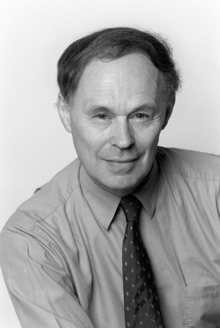Nicholas Wade
| Nicholas Wade | |
|---|---|
 | |
| Born |
17 May 1942 Aylesbury, England |
| Nationality | British |
| Alma mater |
Eton College King's College, Cambridge |
| Occupation | Science journalist, writer |
Nicholas Wade (born 17 May 1942)[1] is a British writer and journalist. He served as the staff writer for the Science Times section of The New York Times from 1982 to 2012.[2][3] He wrote the controversial book A Troublesome Inheritance: Genes, Race and Human History (2014).[4][5][6]
Biography
Wade was born in Aylesbury, England[1] and educated at Eton College.[7] He is the grandson of teacher and author Lawrence Beesley, a survivor of the RMS Titanic.[8] He earned a BA in natural science from King's College, Cambridge in 1964.[1] Wade emigrated to the United States in 1970.[1]
Wade has been a science writer and editor for the journals Nature, from 1967 to 1971, and Science, from 1972 to 1982[9]. He joined The New York Times in 1982[1] and retired in 2012, but he freelances occasionally for his former employer.[10] He had been an editorial writer covering science, environment and defence, and then an editor of the science section.
Two of his books deal with less savoury aspects of scientific research. His 1980 book, The Nobel Duel: Two Scientists' Twenty-one Year Race to Win the World's Most Coveted Research Prize, described the competition between Andrew Schally and Roger Guillemin, whose discoveries regarding the peptide hormone led to them sharing the 1977 Nobel Prize in Physiology or Medicine. According to the Washington Post Book World, it "may be the most unflattering description of scientists ever written." Betrayers of the Truth: Fraud and Deceit in the Halls of Science (1982), co-authored with William J. Broad, discusses historical and contemporary examples of scientific fraud.
In 2014, Wade released A Troublesome Inheritance: Genes, Race and Human History, in which he argued that human evolution has been "recent, copious, and regional" and that genes may have influenced a variety of behaviours that underpin differing forms of human society. The book was criticised in the New York Times Book Review of Sunday 13 July; David Dobbs wrote that it was "a deeply flawed, deceptive, and dangerous book" with "pernicious conceits". Libertarian political scientist Charles Murray, co-author of The Bell Curve, wrote in the Wall Street Journal:
The discoveries Mr. Wade reports, that genetic variation clusters along racial and ethnic lines and that extensive evolution has continued ever since the exodus from Africa, are based on the genotype, and no one has any scientific reason to doubt their validity. And yet, as of 2014, true believers in the orthodoxy still dominate the social science departments of the nation's universities. I expect that their resistance to "A Troublesome Inheritance" will be fanatical, because accepting its account will be seen, correctly, as a cataclysmic surrender on some core premises of political correctness.[11]
Over a hundred geneticists and biologists categorically dismissed Wade's view of race in a joint letter published in The New York Times on 8 August 2014: "Wade juxtaposes an incomplete and inaccurate account of our research on human genetic differences with speculation that recent natural selection has led to worldwide differences in I.Q. test results, political institutions and economic development. We reject Wade's implication that our findings substantiate his guesswork."[12] Wade replied: "I make no such statement. To the contrary, my book explicitly takes no position on the cause of racial differences in I.Q. results, given the difficulty of assessing the many factors other than genetics that heavily influence I.Q. scores. I find it hard to see how any reader of the book could have missed this point, and can only assume that the organizers of the biologists' letter induced many signatories to condemn a book they had not read."[13] Other scientists claimed that Wade had misrepresented their research.[14]
Other books on human evolution by Wade include Before the Dawn: Recovering the Lost History of Our Ancestors (2006), about what Wade has called the "two vanished periods" in human development, and The Faith Instinct (2009), about the evolution of religious behaviour.
References
- 1 2 3 4 5 "Nicholas Wade." Contemporary Authors Online. Detroit: Gale, 2011. Biography in Context. Web. 8 July 2014.
- ↑ Amos Esty (25 May 2006). "The Bookshelf talks with Nicholas Wade". American Scientist.
- ↑ Gitschier J (2005) Turning the Tables—An Interview with Nicholas Wade. PLoS Genet 1(3): e45
- ↑ Michael Hiltzik (12 August 2014). "Racism, the Misuse of Genetics and a Huge Scientific Protest". Los Angeles Times.
- ↑ "A Troublesome Inheritance: Genes, Race and Human History By Nicholas Wade", Penguin Random House webpage. Retrieved 21 May 2017.
- ↑ Jogalekar, Ashutosh, "Genes and Race: The Distant Footfalls of Evidence" (review; blog), Scientific American, 13 May 2014.
- ↑ "Spirit level". The Economist. 17 December 2009. Retrieved 2018-02-14.
- ↑ Wade, Nicholas (9 April 2012). "As Hundreds of Men Perished, One Ignored a Rumor to Survive". The New York Times. Retrieved 10 July 2014.
- ↑ "Nicholas Wade: Journalist & Science Author, Speaker | PRH Speakers Bureau". www.prhspeakers.com. Retrieved 2017-12-09.
- ↑ "Nicholas Wade Interview – A Troublesome Inheritance: Genes, Race and Human History". Luke Ford. 11 May 2014. Retrieved 10 July 2014.
- ↑ Murray, Charles, "Book Review: 'A Troublesome Inheritance' by Nicholas Wade", The Wall Street Journal, May 2, 2014. (subscription required)
- ↑ Coop, Graham, et al., "Letters: ‘A Troublesome Inheritance’", The New York Times, 8 August 2014. "Letters: 'A Troublesome Inheritance': List of 100 signers.
- ↑ Wade, Nicholas, "Letters: ‘A Troublesome Inheritance’", The New York Times, 22 August 2014.
- ↑ Balter, Michael, "Geneticists decry book on race and evolution", Science, 8 August 2014
- Johnson, Eric Michael (21 May 2014) "On the Origin of White Power" Scientific American.
External links
| Wikiquote has quotations related to: Nicholas Wade |